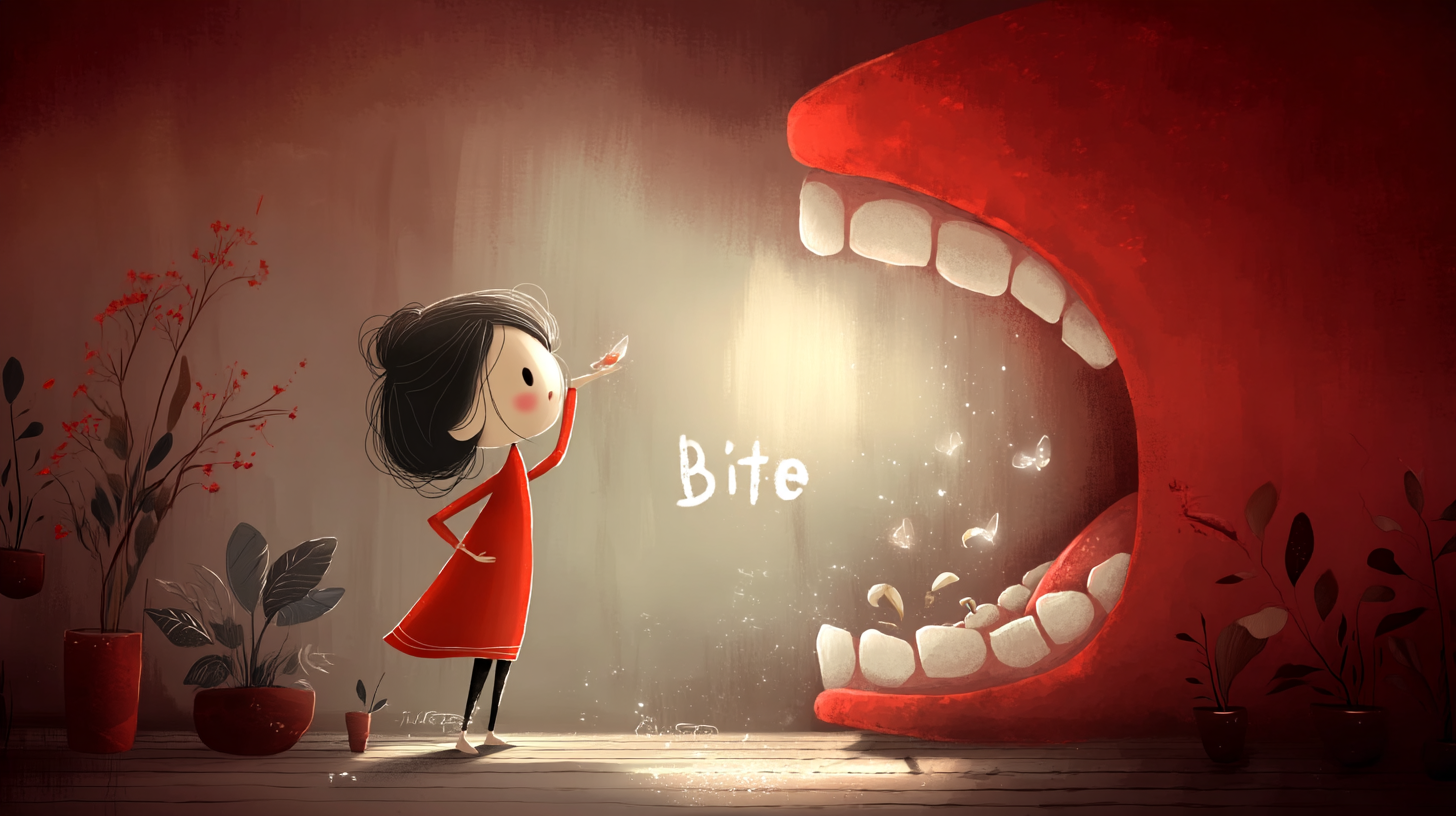“Bite” means to use your teeth to cut or hold something.
「bite」は何かを歯でかんだり、かじったりすることを表す単語です。
以下は英単語 “bite” に関するストーリー型学習コンテンツです。まずは大枠の意味を理解して最後の文章で確認しましょう。
主な意味(main meaning)
| 品詞 | 意味(簡潔) | 英語例文 | 発音記号(IPA) |
|---|---|---|---|
| 動詞 | 歯でかむ、かじる | The dog bit my finger. | /baɪt/ |
| 名詞 | かむこと、かみ傷、ひと口 | He took a bite of the apple. | /baɪt/ |
語源(etymology)
語源は古英語の “bītan”(かむ) に由来し、「歯でしっかりつかむ・切る」というイメージがもとになっています。
類義語(synonyms)
| 類義語 | 英語例文 |
|---|---|
| chew | He chewed the meat slowly. |
| nibble | The rabbit nibbled on the carrot. |
| gnaw | The puppy gnawed on the bone. |
| snap | The dog snapped at the fly. |
| munch | She munched on some popcorn. |
反義語(antonyms)
| 反義語 | 英語例文 |
|---|---|
| lick | The cat licked its paw. |
| kiss | He gave her a quick kiss on the cheek. |
コロケーション(collocations)
| コロケーション | 英語例文 |
|---|---|
| bite the bullet | I decided to bite the bullet and go to the dentist. |
| take a bite | He took a bite of the juicy burger. |
| get bitten | She got bitten by a mosquito. |
| biting cold | The biting cold wind made me shiver. |
| bite your tongue | I wanted to complain, but I bit my tongue. |
2項表現(binomials)
| 表現 | 英語例文 |
|---|---|
| bite and chew | You need to bite and chew your food properly. |
| come and go | The pain from the bite would come and go all day. |
英語ストーリー(english story)
タイトル:The Unexpected Bite
Samantha was working at a pet shop during her summer vacation. She enjoyed playing with the animals and feeding them every day. One day, a new dog named Max arrived at the store. He looked cute and friendly, so Samantha tried to pet him. Suddenly, Max bit her finger. It wasn’t serious, but it hurt.
She took a bite of her sandwich and sighed. “I didn’t expect that,” she said to her coworker, Ken.
“You have to be careful,” he replied. “Some animals snap when they are nervous.”
Samantha nodded. She knew she had to bite the bullet and learn how to deal with difficult animals. Later that day, she watched videos about how to understand dogs’ behavior. She learned that dogs sometimes bite because they are scared.
The next day, she tried again. This time, Max didn’t bite. Instead, he let her pet him.
Ken smiled. “You’re getting better.”
Samantha laughed. “I guess I just needed to bite and chew through the challenge.”
和訳
タイトル:思わぬ「かみつき」
サマンサは夏休みにペットショップで働いていました。毎日動物と遊んだり、エサをあげたりするのが楽しかったのです。ある日、新しい犬のマックスが店に来ました。かわいくて優しそうに見えたので、サマンサはなでようとしました。すると、突然マックスが彼女の指を**かんだ(bite)**のです。たいしたことはなかったけれど、痛みました。
彼女はサンドイッチを**ひと口(bite)食べて、ため息をつきました。「予想外だったな」と彼女は同僚のケンに言いました。
「気をつけないとね。動物って不安なときにかみつく(snap)**ことがあるよ」とケンは答えました。
サマンサはうなずきました。勇気を出して(bite the bullet)、難しい動物への対応を学ばなければと感じました。その日の午後、彼女は犬の行動を理解するための動画を見ました。犬が怖がっているときに**かむ(bite)**ことがあると知ったのです。
翌日、彼女は再挑戦しました。今度はマックスが**かまない(bite)で、なでさせてくれました。
ケンはほほえみました。「上手くなってきたね」
サマンサは笑って言いました。「乗り越えるには時間がかかるけど、ちゃんとbite and chewできたみたいね」
Q&A
Q: 「bite」と「nibble」の違いは?
A: 「bite」はしっかりとかむことを表し、痛みを伴うこともあります。「nibble」は少しずつやさしくかじることで、ウサギがにんじんをかじるようなイメージです。
Q: 「bite」と「chew」の違いは?
A: 「bite」は一回かんで切るような動作、「chew」はかんで食べ物をすりつぶす動作です。食べるときは「bite」してから「chew」することが多いです。
Q: 「bite」と「gnaw」の違いは?
A: 「gnaw」は長時間ずっとかじり続けることを指します。たとえば、犬が骨を長くかじるときに使います。「bite」は一瞬のかみつきを表します。
Q: 「bite」と「snap」の違いは?
A: 「snap」は突然素早くかみつく動作で、攻撃的な感じがあります。「bite」もかむ意味ですが、「snap」はより急で本能的な印象です。
Q: 「bite」と「munch」の違いは?
A: 「munch」は音を立てながら、しっかりとよくかんで食べることです。「bite」はかむ動作そのもので、「munch」は楽しんでかむというニュアンスが含まれます。
Q: 「bite」と「lick」の違いは?
A: 「bite」は歯でかむこと、「lick」は舌でなめることです。意味も動作もまったく異なります。
Q: 「bite」と「bite the bullet」の違いは?
A: 「bite」は文字通りかむことですが、「bite the bullet」は「つらいことを覚悟してやる」というイディオム(慣用句)です。比喩的に使われます。
Q: 「bite」と「biting cold」の関係は?
A: 「biting cold」は「刺すような寒さ」という比喩表現で、寒さが肌をかむように感じることを指します。実際に「bite」するわけではありません。
Q: 「bite」と「bite your tongue」の違いは?
A: 「bite your tongue」は「言いたいことを我慢する」という意味の表現です。「bite」は比喩的に、自分の舌をかんで言葉を飲み込む様子を表しています。



コメント